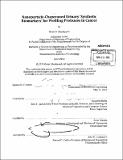Nanoparticle-chaperoned urinary 'synthetic biomarkers' for profiling proteases in cancer
Author(s)
Abudayyeh, Omar O
DownloadFull printable version (7.208Mb)
Other Contributors
Massachusetts Institute of Technology. Dept. of Mechanical Engineering.
Advisor
Sangeeta Bhatia and Scott Manalis.
Terms of use
Metadata
Show full item recordAbstract
Many biomarker-based diagnostics have poor predictive value because of their dependence on naturally occurring endogenous biomolecules to indicate disease. This work presents a diagnostic platform that uses nanoparticles to profile underlying proteolytic signatures of diseases. In this thesis, work is presented on long circulating peptide-nanoparticle probes that can survey, sense, and remotely report on dysregulated protease activities in cancer. In this strategy, iron oxide nanoparticles are utilized as chaperons to deliver protease-specific peptide libraries to tumors whereupon selective cleavage by active proteases releases peptide fragments that are cleared by the renal system into the urine. These peptide fragments are pre-designed with internal photolabile triggers that un-cage isobaric peptide mass tags optimized for multiplexed LC MS/MS quantification. Results demonstrate that such peptide 'synthetic biomarker' panels uncover unique proteolytic signatures that can be correlated with disease states, allowing for the detection of cancer and potential long-term monitoring of disease using an implantable form. This concept of administering prodiagnostic reagents and analyzing remote reporters is amenable to a broad range of protease-dependent complex diseases, such as liver fibrosis and coagulopathies, and infectious disease.
Description
Thesis (S.B.)--Massachusetts Institute of Technology, Dept. of Mechanical Engineering, 2012. Cataloged from PDF version of thesis. Includes bibliographical references (p. 61-63).
Date issued
2012Department
Massachusetts Institute of Technology. Department of Mechanical EngineeringPublisher
Massachusetts Institute of Technology
Keywords
Mechanical Engineering.